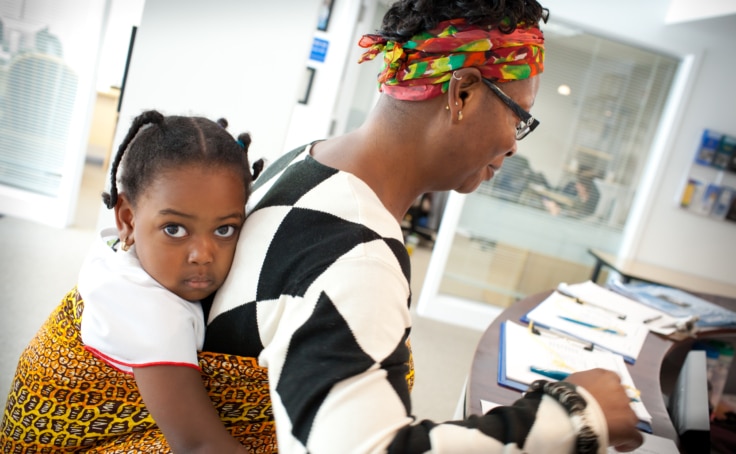Why is Black representation important in the early childhood field?


Tiara began her early childhood career in 2003 as a home visitor with Healthy Families Athens and now serves…
Equity is often perceived as a “black and white” issue, but in early childhood education, it encompasses far more. In this vignette, I aim to highlight the importance of Black representation and the ongoing efforts to ensure equity remains central to my work.
About ten years ago, a conversation with a white colleague opened my eyes to the depth of misunderstanding around equity. I mentioned that my right to vote required periodic reauthorization and that African Americans have never had a truly equal playing field. She was shocked and initially skeptical, but after verifying my statement, she shared what she had learned with her family. This conversation underscored the reality that people often don’t know what they don’t know. Motivated by this realization, we began equity work within our home visiting team, though we initially faced anger and resistance. Despite the pushback, we continued to address inequities through individual conversations and actions, such as confronting a coworker whose son wore blackface for Halloween.
Fast forward eight years, our agency welcomed a new director who prioritized inclusivity as a core value. As the program expanded, we focused on ensuring our home visitors reflected the diverse populations we served. At the time, only one of our home visitors was African American, despite African Americans comprising about 50% of the families in our program. To address this imbalance, we expanded our recruitment strategies by advertising job openings at Historically Black Colleges and Universities (HBCUs) and reserving intern positions for students from local community colleges, often non-traditional students who later became employees. I also encouraged a program participant to apply for a home visitor role, valuing her firsthand experience and perspective as an African American mother. Today, two program graduates are employed with our agency—one as a home visitor and the other in our intake program.
I believe that when families see people who look like them, trust is built. Once trust is established, families can envision their own potential and, in turn, contribute to uplifting their communities.
Tiara Smith
As our team grew, Healthy Families America adjusted educational requirements for supervisory positions, allowing us to promote based on lived and professional experience. To further strengthen our practice, our entire team participated in a leadership development program. Additionally, we developed an equity plan, updated annually, to address service gaps and better support families.
Over the years, our data has consistently shown that Black families make up about 50% of our population, yet they decline services at the highest rate. This reinforces my commitment to fostering representation and trust.

Mariah began her journey in early childhood education out of necessity, but it quickly became her passion during four…
Black representation in the early childhood field is crucial because all children deserve equitable care and the opportunity to learn from a diverse group of educators. Representation allows children to see themselves reflected in their teachers, fostering a sense of belonging and self-worth. At the same time, experiencing diversity helps children appreciate and respect perspectives different from their own.
When diversity thrives, it ensures that no group is marginalized or prejudged—everyone has a seat at the table and an equal opportunity to thrive.
Mariah Scarver
As a Black leader in the South, where discussions of diversity, equity, and inclusion are often met with resistance, I understand the importance of being a voice for those who are underrepresented or silenced. It is my responsibility to speak up for educators and children who might otherwise be overlooked. I aim to ensure equity in my work by staying as unbiased as possible and placing myself in the shoes of early childhood providers, a role I once held. By advocating for those who are overworked and underpaid, in childcare, I use my position to push for fair treatment and resources that reflect the value of their work. Equity isn’t just an ideal; it’s a necessity, and I strive every day to make it a reality for those I serve.

Canissa is dedicated to fostering strong foundations in early childhood education. After 11 years as a secondary math and…
Black representation in early childhood education is essential for fostering cultural competence, supporting diversity, and ensuring equitable opportunities for all children. Many childhood developmental theories and practices were created by non-Black or Hispanic theorists whose research often excluded non-white children. To address this gap, the field must expand its research and understanding of diverse cultural practices to better serve and nurture non-white children in early education programs. Through research and professional development, we can bridge the gap between theory and practice to implement culturally affirming practices in early childhood education.
In my work, I strive to ensure equity by reflecting the cultures and values of my students in my classroom, instruction, and curricula. I believe education should be representative of students’ interests, values, languages, and cultures. As an educator of predominantly Black and Hispanic students, I ensure their education reflects and affirms their identities. Teaching in the community where I was raised has given me an understanding of the language and values of the families I serve. I incorporate Afro-Hispanic culture into my teaching and use students’ native languages within the curriculum. For example, I create opportunities for Spanish-language read-alouds, vocabulary development, and activities that deepen their understanding of their language and culture.
Access to high-quality early education should never be a barrier for any child, and I am proud to make a difference in the lives of the families and children I serve.
Canissa Grant
As an emergent language teacher for infants and toddlers, I recognize that language is the foundation for learning and communication. I work closely with families, providing translation services and collaborating with service providers to advocate for their children’s needs. I also remain committed to updating my knowledge of anti-racist and culturally sustaining practices to ensure my teaching evolves with the needs of the community.
Black and Hispanic families are disproportionately affected by systemic barriers, including living in segregated neighborhoods with limited access to high-quality early childhood education. To address this, I created Developing Language for Infants and Toddlers to provide access to high-quality care for children with and without disabilities in low-income neighborhoods. My mission is to expand these services to reach more families and meet their needs. This includes offering training on guided play and educating parents about childcare options. Access to high-quality early education should never be a barrier for any child, and I am proud to make a difference in the lives of the families and children I serve.

Christina holds a PhD in School Psychology from Teachers College, Columbia University, with training in early childhood community psychology…
“I feel like the teacher already decided my child is the problem.” “It seems the doctors aren’t listening to me or taking my symptoms seriously.” These sentiments, shared with me by Black mothers, reflect experiences that are far too common. Systemic racism within medical and educational systems continues to disproportionately impact Black families. Black children are more likely to be suspended or expelled from preschool, and teachers are more likely to raise concerns about their behavior. Additionally, Black mothers face significantly higher rates of maternal mortality after giving birth.
One moment I’ll never forget was when a mother shared how much it meant for her 4-year-old daughter to have a young Black pediatrician caring for her.
Christina Fiorvanti
To better understand how these realities affect our pediatric patients at Montefiore, we began assessing all families for experiences of racial bias and discrimination. The stories we heard were both heartbreaking and inspiring. One moment I’ll never forget was when a mother shared how much it meant for her 4-year-old daughter to have a young Black pediatrician caring for her. Her daughter told her excitedly, “I want to be a doctor just like Dr. Parks when I grow up.”
This Black History Month, I am reflecting on and feeling deeply grateful for the incredible Black doctors and early childhood professionals I’ve had the privilege of working with and learning from over the years. One of those brilliant individuals is my friend and former colleague, Dr. Dana Crawford. Her Crawford Bias Reduction Theory and Training (CBRT) model has been transformative for me. It taught me the importance of reflecting on my own biases with openness and honesty, understanding them, and actively working to reduce them.
In my work—previously in the South Bronx and now in Queens—alongside an amazing and diverse group of families and colleagues, the first step in addressing bias and racism is acknowledging that bias is a human trait. Through reflective supervision and collaborative support, I’ve seen how being honest with ourselves and others can lead to meaningful, positive change. Together, we can work toward creating more equitable systems for all families.


